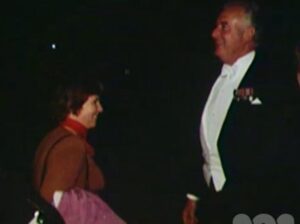
Photo: Museum of Australian Democracy
It was a glorious sunny Canberra day, Prime Minister Gough Whitlam had just left the office for his 1.30pm appointment with the Governor-General to request a Half-Senate election. Seizing this rare opportunity, I crossed the road to have my sandwich lunch in the Parliamentary Rose Garden. Sitting there, I felt a sense of relief that the political and constitutional crisis the nation had endured during the previous two months would soon be over. I was convinced, given the Prime Minister’s superb campaigning skills, that he could win yet another victory.
Surely the Australian people would recognise the social reforms already introduced had changed the country. Conscription was abolished and the troops were brought home from Vietnam; tuition fees for all University and Technical College students were abolished and they received a living allowance. Amid huge controversy, he approved $1.3 million to purchase Jackson Pollock’s Blue Poles for an unfinished National Gallery. The Public Service recommended against this acquisition and strongly suggested that the Prime Minister not publicise the purchase or the cost. Whitlam scrawled on this memo ‘tell the people, include the cost’. He believed an international gallery should have internationally recognised works.
Enjoying the tranquillity, I reflected on the previous hectic 24 hours. Last night we had left Melbourne at 11.30pm. The Prime Minister was ebullient after his stellar performance as guest speaker at the Melbourne Lord Mayor’s Banquet. He enjoyed formal occasions, knowing he presented an imposing figure in white tie and medals. He was also excited, as he knew tomorrow, he would offer a solution to the Governor-General and the crisis would be over.

Photo: Elizabeth Cham and Gough Whitlam (supplied)
Sitting on the VIP plane, I was surprised to see the Prime Minister arrive with a number of Liberal members of Parliament, whose names were not included on the flight manifest. Malcolm Fraser, Opposition Leader, and his Deputy, Phillip Lynch, former leaders Billy Snedden and William (Billy) McMahon, prominent Liberal Andrew Peacock; all had also been invited to the Banquet. Initially, it seemed surprising, that so many Liberal members had travelled to Melbourne to be guests of the Lord Mayor. Quickly, I realised they were not paying homage to Ron Walker the Lord Mayor, but to a businessman, who was the Liberal Party’s highly successful ‘bagman’. Another reason was the 8.00am appointment Fraser and Lynch had with Prime Minister, when he planned to inform them of his decision to proceed with a Half-Senate election.
Peacock, known as the ‘colt from Kooyong’ walked to the rear of the aircraft, traditionally reserved for staff. The late John Mant, Principal Private Secretary (today CEO of PMO) and David Solomon Press Secretary were wondering how they were going to deal with an inebriated Peacock. His vicious remarks, revealed extraordinary enmity for Malcolm Fraser.
George Negus was also on the flight with a cameraman. Permission had been given to film on board and I remember they were excited, not only would they be filming the Prime Minister, but now also the Leader and Deputy Leader of the Opposition. There was an awareness this was a rare opportunity to film Australia’s political elite, all together, during this critical moment in the Nation’s political and constitutional history. This film was to be shown the next evening on the ABC’s This Day Tonight programme. Given the events that unfolded the next day it was old news and never broadcast.
We arrived in Canberra at 12.30am on Tuesday 11 November 1975. Stepping off the aircraft the Prime Minister appeared supremely confident, little realising that in a little more than twelve hours he would no longer be Prime Minister, that the Governor-General he appointed would sack him.
There are still many stories that have not been recorded or published about this momentous day. An example is Bobby Beadman, the Commonwealth car driver who collected Malcolm Fraser and Phillip Lynch from the plane in the early hours of the 11th. Later that day, he told a group of us what he heard from the backseat, ‘what if John does not do it tomorrow?” Not certain what he had heard or who he should ring at 1.00am, he decided against informing anyone.
Elizabeth Cham worked as a personal assistant to the Prime Minister’s principal private secretary, and worked for Gough Whitlam until 1977, well after his dismissal. She later worked for Manning Clark, and is a former National Director of Philanthropy Australia, and a former board member of the Australia Institute.
The 2026 Melbourne Fashion Festival is on this week. This year’s event marks a major milestone as the festival celebrates its 30-year anniversary. It's one of the biggest fashion events in Australia, and it puts Australian design, talent, innovations, skills, trends, and workers in the international spotlight.